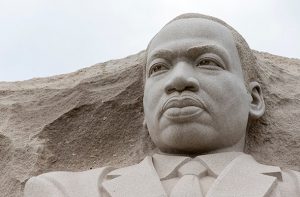 “It was all a dream, I used to read Word Up! Magazine / Salt-n-Pepa and Heavy D up in the limousine.” — The Notorious B.I.G.
“It was all a dream, I used to read Word Up! Magazine / Salt-n-Pepa and Heavy D up in the limousine.” — The Notorious B.I.G.
On October 26, 1967, Martin Luther King Jr. stopped by Barratt Junior High School in Philadelphia to invite its students and their parents to join him and other icons of the time — like Harry Belafonte, Aretha Franklin, Nipsey Russel, and Sidney Poitier — for the “freedom festival” in the (since-demolished) Spectrum sports arena later that night, in support of the civil rights movement.
But he didn’t just give an informal invite to Barratt’s students that day, he delivered one of his powerful sermons to those who gathered at this special assembly. I’m still in awe that MLK would drop by a junior high school to give such a historical address.

How LexisNexis State Net Uses Gen AI To Tame Gov’t Data
Its new features transform how you can track and analyze the more than 200,000 bills, regulations, and other measures set to be introduced this year.
Perhaps I shouldn’t be surprised. Five months later, he visited an all-white Detroit suburb and delivered his famous lesson “The Other America” at Grosse Pointe South High School, less than 15 miles southwest of where I grew up. Despite incessant interruptions by the Detroit-area right-wing group Breakthrough, King carried on and delivered his speech with conviction to the gym of 2,000 attendees.
Less than three weeks later, Martin Luther King Jr. was assassinated.
Most people remember King’s speech at Barrat because of his final line referencing the poem “Mother to Son” by Langston Hughes: “Well life for none of us has been a crystal stair. But we must keep moving, we must keep going. If you can’t fly, run. If you can’t run, walk. If you can’t walk, crawl. But by all means, keep moving.”
At the end of his speech, he implores the Barrat audience of adolescents to “keep moving,” for King knows all too well the importance of carrying on. But in the beginning of his speech, he asks these teenagers, “What is your life’s blueprint?” MLK then offers his advice:

How The Law Office Of Stephen L. Thomas Jr. Reclaimed Valuable Hours And Strengthened Client Care With 8am
Founded in 2017, the Baltimore-based Law Office of Stephen L. Thomas Jr. unified case management, communication, and payments with 8am—saving 10–20 hours a week for clients, trials, and growth.
I want to suggest some of the things that should begin your life’s blueprint. Number one in your life’s blueprint, should be a deep belief in your own dignity, your worth and your own somebodiness. Don’t allow anybody to make you fell that you’re nobody. Always feel that you count. Always feel that you have worth, and always feel that your life has ultimate significance.
Secondly, in your life’s blueprint you must have as the basic principle the determination to achieve excellence in your various fields of endeavor. You’re going to be deciding as the days, as the years unfold what you will do in life—what your life’s work will be. Set out to do it well….
And when you discover what you will be in your life, set out to do it as if God Almighty called you at this particular moment in history to do it. Don’t just set out to do a good job. Set out to do such a good job that the living, the dead, or the unborn couldn’t do it any better.
Finally, in your life’s blueprint, must be a commitment to the eternal principles of beauty, love, and justice…. Don’t allow anybody to pull you so low as to make you hate them. Don’t allow anybody to cause you to lose your self-respect to the point to where you do not struggle for justice.
However young you are, you have a responsibility to seek to make your nation a better nation in which to live. You have a responsibility to seek to make life better for everybody. And so you must be involved in the struggle of freedom and justice.
Martin Luther King Jr.’s advice for creating one’s blueprint is not overly complicated. But neither is it easy to recall or heed sometimes.
In her book Their Eyes Were Watching God, Zora Neale Hurston, a notable leader of the Harlem Renaissance, wrote: “There are years that ask questions and years that answer.” I think about this passage often when I think about my life’s blueprint as well as the current state of affairs in our country.
King spent the last year of his life spreading his message across the nation. He created the blueprint for the next several generations of leaders to come. We would do well to remember his legacy more than once a year.
In challenging moments or when you are undergoing a particularly tough year, don’t let anybody make you feel like you are nobody, always realize your self-worth. And if nothing else, by all means, make sure to keep moving.
Renwei Chung is the Diversity Columnist at Above the Law. You can contact Renwei by email at [email protected], follow him on Twitter (@renweichung), or connect with him on LinkedIn.